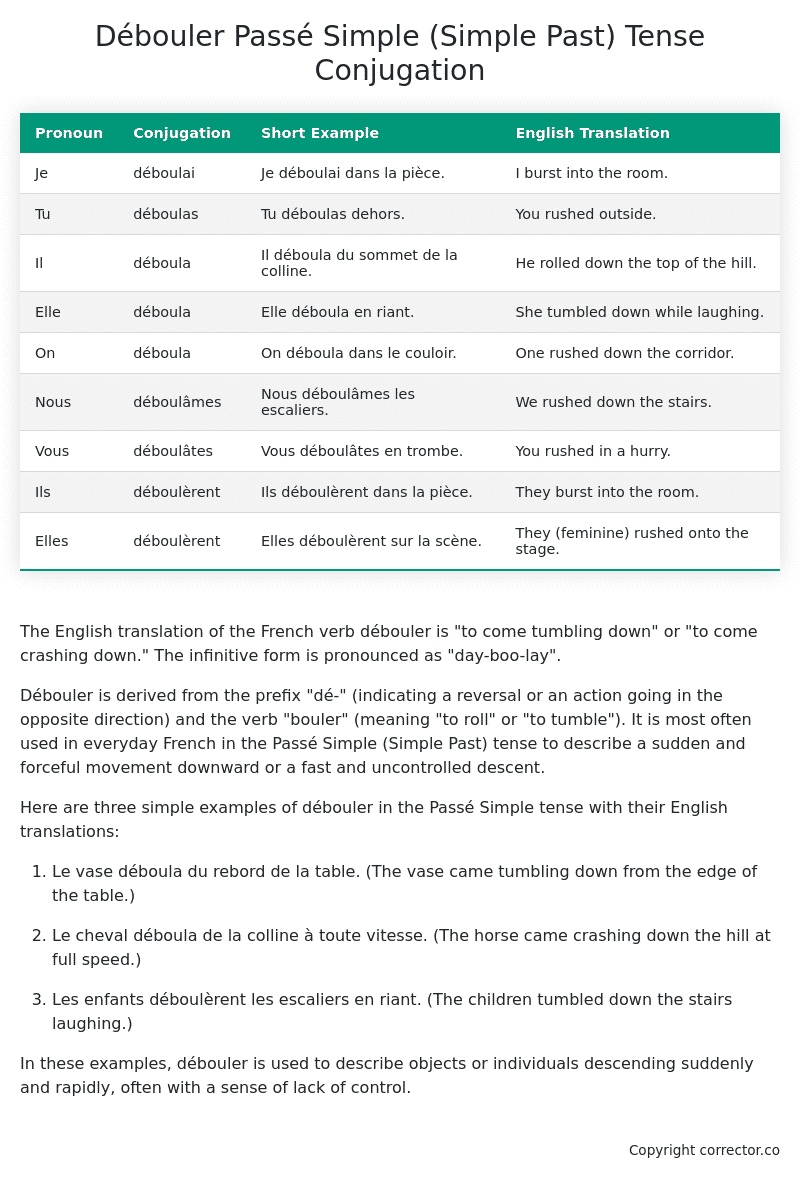Passé Simple (Simple Past) Tense Conjugation of the French Verb débouler
Introduction to the verb débouler
The English translation of the French verb débouler is “to come tumbling down” or “to come crashing down.” The infinitive form is pronounced as “day-boo-lay”.
Débouler is derived from the prefix “dé-” (indicating a reversal or an action going in the opposite direction) and the verb “bouler” (meaning “to roll” or “to tumble”). It is most often used in everyday French in the Passé Simple (Simple Past) tense to describe a sudden and forceful movement downward or a fast and uncontrolled descent.
Here are three simple examples of débouler in the Passé Simple tense with their English translations:
-
Le vase déboula du rebord de la table.
(The vase came tumbling down from the edge of the table.) -
Le cheval déboula de la colline à toute vitesse.
(The horse came crashing down the hill at full speed.) -
Les enfants déboulèrent les escaliers en riant.
(The children tumbled down the stairs laughing.)
In these examples, débouler is used to describe objects or individuals descending suddenly and rapidly, often with a sense of lack of control.
Table of the Passé Simple (Simple Past) Tense Conjugation of débouler
| Pronoun | Conjugation | Short Example | English Translation |
|---|---|---|---|
| Je | déboulai | Je déboulai dans la pièce. | I burst into the room. |
| Tu | déboulas | Tu déboulas dehors. | You rushed outside. |
| Il | déboula | Il déboula du sommet de la colline. | He rolled down the top of the hill. |
| Elle | déboula | Elle déboula en riant. | She tumbled down while laughing. |
| On | déboula | On déboula dans le couloir. | One rushed down the corridor. |
| Nous | déboulâmes | Nous déboulâmes les escaliers. | We rushed down the stairs. |
| Vous | déboulâtes | Vous déboulâtes en trombe. | You rushed in a hurry. |
| Ils | déboulèrent | Ils déboulèrent dans la pièce. | They burst into the room. |
| Elles | déboulèrent | Elles déboulèrent sur la scène. | They (feminine) rushed onto the stage. |
Other Conjugations for Débouler.
Le Present (Present Tense) Conjugation of the French Verb débouler
Imparfait (Imperfect) Tense Conjugation of the French Verb débouler
Passé Simple (Simple Past) Tense Conjugation of the French Verb débouler (You’re reading it right now!)
Passé Composé (Present Perfect) Tense Conjugation of the French Verb débouler
Futur Simple (Simple Future) Tense Conjugation of the French Verb débouler
Futur Proche (Near Future) Tense Conjugation of the French Verb débouler
Plus-que-parfait (Pluperfect) Tense Conjugation of the French Verb débouler
Passé Antérieur (Past Anterior) Tense Conjugation of the French Verb débouler
Futur Antérieur (Future Anterior) Tense Conjugation of the French Verb débouler
Subjonctif Présent (Subjunctive Present) Tense Conjugation of the French Verb débouler
Subjonctif Passé (Subjunctive Past) Tense Conjugation of the French Verb débouler
Subjonctif Imparfait (Subjunctive Imperfect) Tense Conjugation of the French Verb débouler
Subjonctif Plus-que-parfait (Subjunctive Pluperfect) Tense Conjugation of the French Verb débouler
Conditionnel Présent (Conditional Present) Tense Conjugation of the French Verb débouler
Conditionnel Passé (Conditional Past) Tense Conjugation of the French Verb débouler
Conditionnel Passé II (Conditional Past II) Tense Conjugation of the French Verb débouler
L’impératif Présent (Imperative Present) Tense Conjugation of the French Verb débouler
L’impératif Passé (Imperative Past) Tense Conjugation of the French Verb débouler
L’infinitif Présent (Infinitive Present) Tense Conjugation of the French Verb débouler
L’infinitif Passé (Infinitive Past) Tense Conjugation of the French Verb débouler
Le Participe Présent (Present Participle) Tense Conjugation of the French Verb débouler
Le Participe Passé (Past Participle) Tense Conjugation of the French Verb débouler
Struggling with French verbs or the language in general? Why not use our free French Grammar Checker – no registration required!
Get a FREE Download Study Sheet of this Conjugation 🔥
Simply right click the image below, click “save image” and get your free reference for the débouler Passé Simple tense conjugation!

Débouler – About the French Passé Simple (Simple Past) Tense
Formation
Usage
Narration
Historical Context
Interactions with other tenses
Passé Composé
Imparfait
Conditional and Subjunctive
Summary
I hope you enjoyed this article on the verb débouler. Still in a learning mood? Check out another TOTALLY random French verb conjugation!


